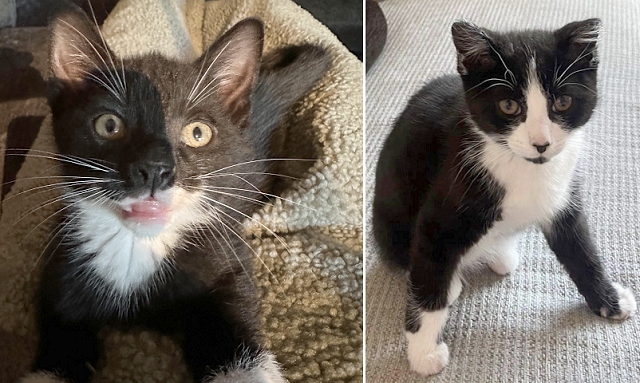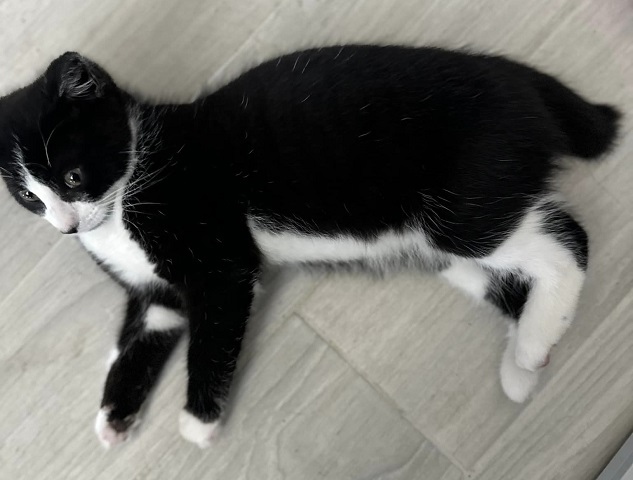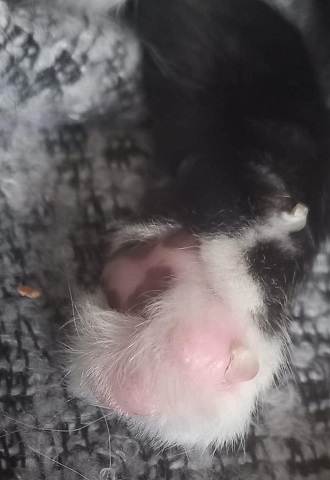Gizmo's Legacy founder urges cat owners to spay and neuter their pets after 'increase in births of inbred kittens'
Date published: 09 July 2023

The two kittens born with disfigurements: Smooch, left, and Thumper, right
The woman behind the Gizmo’s Legacy campaign – which is pushing for a UK law to ensure that every deceased cat is scanned for a microchip by local authorities – is urging cat owners to spay and neuter their pets after an increase in inbred kittens being born.
Heléna Abrahams, who lives in the grounds of Fairfield Hospital, says there has been an increase in the number of kittens being born with deformities as a result of inbreeding. Heléna takes in cats and kittens in addition to running her own cat-sitting service.
She said: “There are more and more deformed kittens being born due to inbreeding between siblings, which works the same as inbreeding in humans.
“I now have two disfigured kittens, and one, in particular, has so many deformities unseen by most vets.”
Smooch and Thumper are both kittens resulting from inbred litters. Smooch, the older kitten, has a disfigured mouth, resulting in him being unable to close his mouth, whilst Thumper has a range of abnormalities.
Thumper has four deformed legs – one of which may need amputating – clubbed front paws, no claws except for three ‘random’ ones, no toe pads and his ears and tail are only half-developed.

“With Thumper, we don’t know if anything internally is wrong,” Heléna added. “Smooch can’t yawn easily or close his mouth because the flesh around his jaw isn’t attached to his gums. Thumper is the worst case of inbreeding I’ve ever seen.
“Anyone who says they’re not spaying their cat until she’s had a litter ‘because all cats should have a litter’ should look at Thumper. He limps because he’s in pain and will need constant monitoring as he grows.”
Heléna continued: “Cats breed with their siblings at a very young age. Not only that, but a female cat who is not spayed can have many males mate with her and the kittens can all have different fathers, who can carry diseases and illnesses.”
Female cats can become pregnant as early as four months old and two unneutered cats of opposite sex, will mate with each other even if they are brother and sister, or parents, as animals don't respect family relationships. This increases the risk of offspring with birth defects and deformities.
Congenital defects and genetic diseases are carried by recessive alleles: animals born to a close relative are more likely to receive a recessive gene, meaning a greater chance of inheriting the defect or illness from the carrier.
The Australian RSPCA also notes: “Inbred animals are more likely to have genetic defects and inherited diseases, which can be extremely detrimental to their health and welfare. This can include fertility problems, reduced survival and fitness of offspring, and weakened immune systems.”

It is recommended that owners keep a male and female pair separate, even if they have come from the same litter, as this will also help to avoid any unwanted pregnancies and illnesses.
The Cats Protection charity recommends neutering kittens at around four months of age, when kittens reach sexual maturity, or younger.
There are an estimated 10 million cats in the UK and on average around 91% of owned cats are neutered year on year. During the pandemic, this figure dropped to 86% with a wait list for procedures including neutering.
The RSPCA said at the time that the wait list might have resulted in “high number of unwanted litters being born which will mean more pressure on rescue charities like ourselves.”
In 2021, the charity took in over 4,000 cats: many of these were unwanted litters which had been abandoned in boxes, pet carriers or even thrown in bins.
The PDSA 2021 PAW Report found that 14% of owners of female cats said that their cat had at least one litter prior to being spayed and 62% of these said that the litter was unplanned.
Neutered male cats are less likely to roam (unneutered males can travel for miles to search for an unneutered female), reducing the risk of them being run over, and making them less likely to fight. This also reduces the risk of getting injured or contracting serious diseases such as Feline Immunodeficiency Virus (FIV) or Feline Leukaemia Virus (FeLV).
Unneutered female cats will often have litters of kittens three times a year. This adds to the overpopulation problem and increases costs for the owner, especially if there are complications during pregnancy or birth. They are also more likely to contract diseases spread through sexual contact and mating behaviour.
Cats Protection adds that kittens born following an unplanned pregnancy may also find themselves homeless, or deprive another unwanted cat or kitten from finding a new home as there are not enough homes to go around.
In five years, just one unneutered cat female cat can be responsible for 20,000 descendants.
Cats Protection adds: “Many owners don’t know which roaming ‘stranger’ cats their unneutered pet may have mated with, so are unaware of the potentially fatal infectious diseases that the cat may have been infected with.
“Also the temperament of the tom can affect the behaviour of any offspring which are born. Risking mating with an unknown ‘stranger’ can lead to the birth of kittens that are unsuitable as family pets.”
For more information about neutering your cat, please visit the Cats Protection website:
Do you have a story for us?
Let us know by emailing news@rochdaleonline.co.uk
All contact will be treated in confidence.
Most Viewed News Stories
To contact the Rochdale Online news desk, email news@rochdaleonline.co.uk or visit our news submission page.
To get the latest news on your desktop or mobile, follow Rochdale Online on Twitter and Facebook.


